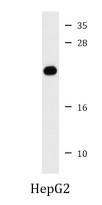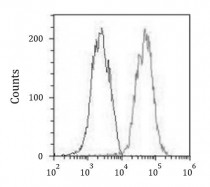ARG59724
anti-ID1 antibody
anti-ID1 antibody for Flow cytometry,Western blot and Human,Rat
Overview
| Product Description | Rabbit Polyclonal antibody recognizes ID1 |
|---|---|
| Tested Reactivity | Hu, Rat |
| Predict Reactivity | Ms |
| Tested Application | FACS, WB |
| Host | Rabbit |
| Clonality | Polyclonal |
| Isotype | IgG |
| Target Name | ID1 |
| Antigen Species | Human |
| Immunogen | KLH-conjugated synthetic peptide corresponding to aa. 66-93 of Human ID1. |
| Conjugation | Un-conjugated |
| Alternate Names | DNA-binding protein inhibitor ID-1; Class B basic helix-loop-helix protein 24; Inhibitor of DNA binding 1; ID; bHLHb24; Inhibitor of differentiation 1 |
Application Instructions
| Application Suggestion |
|
||||||
|---|---|---|---|---|---|---|---|
| Application Note | * The dilutions indicate recommended starting dilutions and the optimal dilutions or concentrations should be determined by the scientist. | ||||||
| Positive Control | HepG2 |
Properties
| Form | Liquid |
|---|---|
| Purification | Purification with Protein A and immunogen peptide. |
| Buffer | PBS and 0.09% (W/V) Sodium azide. |
| Preservative | 0.09% (W/V) Sodium azide. |
| Storage Instruction | For continuous use, store undiluted antibody at 2-8°C for up to a week. For long-term storage, aliquot and store at -20°C or below. Storage in frost free freezers is not recommended. Avoid repeated freeze/thaw cycles. Suggest spin the vial prior to opening. The antibody solution should be gently mixed before use. |
| Note | For laboratory research only, not for drug, diagnostic or other use. |
Bioinformation
| Database Links |
Swiss-port # P41134 Human DNA-binding protein inhibitor ID-1 |
|---|---|
| Gene Symbol | ID1 |
| Gene Full Name | inhibitor of DNA binding 1, dominant negative helix-loop-helix protein |
| Background | The protein encoded by this gene is a helix-loop-helix (HLH) protein that can form heterodimers with members of the basic HLH family of transcription factors. The encoded protein has no DNA binding activity and therefore can inhibit the DNA binding and transcriptional activation ability of basic HLH proteins with which it interacts. This protein may play a role in cell growth, senescence, and differentiation. Two transcript variants encoding different isoforms have been found for this gene. [provided by RefSeq, Jul 2008] |
| Function | Transcriptional regulator (lacking a basic DNA binding domain) which negatively regulates the basic helix-loop-helix (bHLH) transcription factors by forming heterodimers and inhibiting their DNA binding and transcriptional activity. Implicated in regulating a variety of cellular processes, including cellular growth, senescence, differentiation, apoptosis, angiogenesis, and neoplastic transformation. Inhibits skeletal muscle and cardiac myocyte differentiation. Regulates the circadian clock by repressing the transcriptional activator activity of the CLOCK-ARNTL/BMAL1 heterodimer (By similarity). [UniProt] |
| Cellular Localization | Cytoplasm. Nucleus. [UniProt] |
| Calculated MW | 16 kDa |
Images (2) Click the Picture to Zoom In
-
ARG59724 anti-ID1 antibody WB image
Western blot: 20 µg of HepG2 cell lysate stained with ARG59724 anti-ID1 antibody at 1:1000 dilution.
-
ARG59724 anti-ID1 antibody FACS image
Flow Cytometry: HepG2 cells were fixed with 2% paraformaldehyde (10 min) and then permeabilized with 90% methanol for 10 min. Cells were then incubated in 2% BSA to block non-specific protein-protein interactions followed by ARG59724 anti-ID1 antibody (right histogram) at 1:25 dilution for 60 min at 37°C, followed by DyLight®488 labelled secondary antibody. Isotype control antibody (left histogram) was rabbit IgG (1 µg/10^6 cells) used under the same conditions. Acquisition of > 10000 events was performed.







